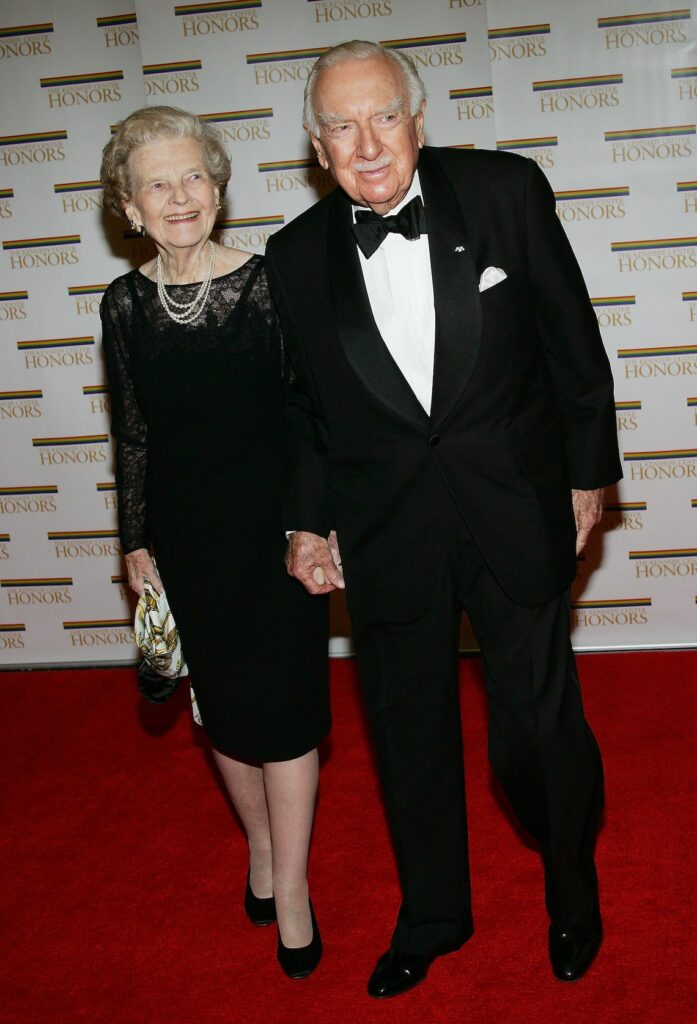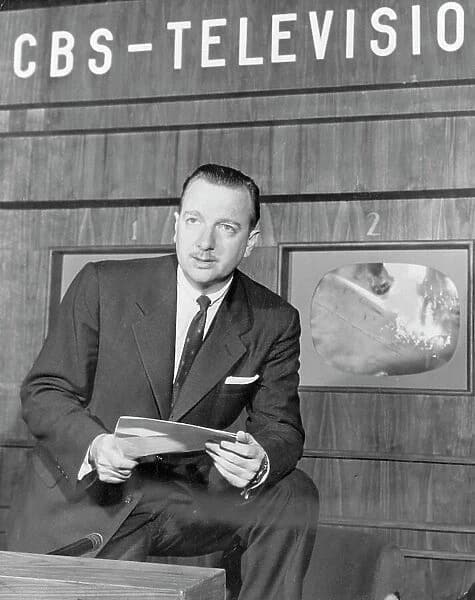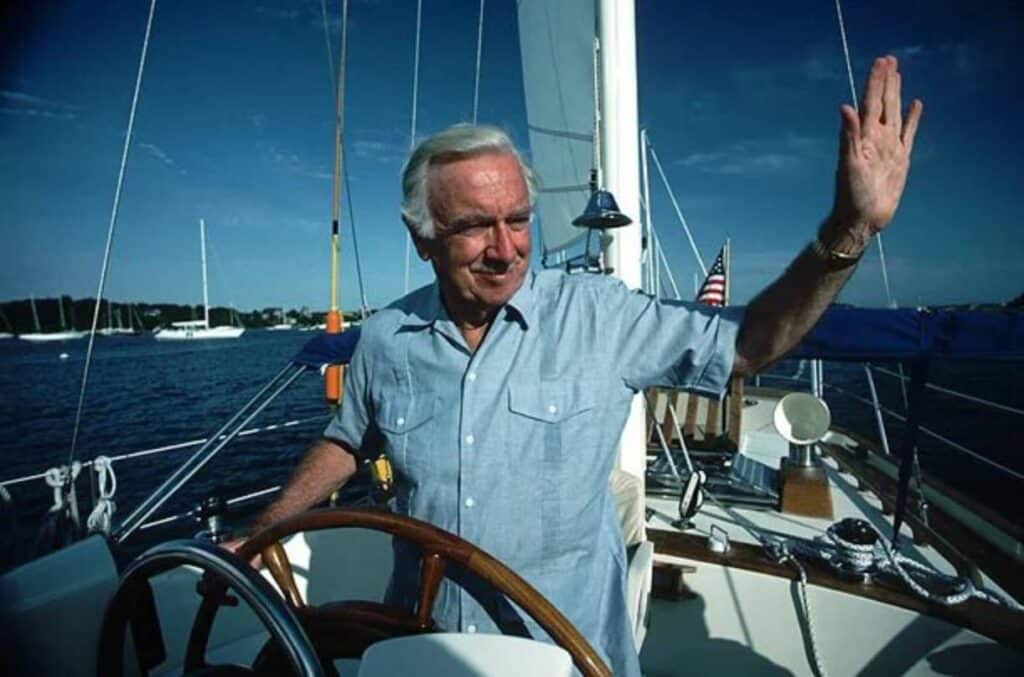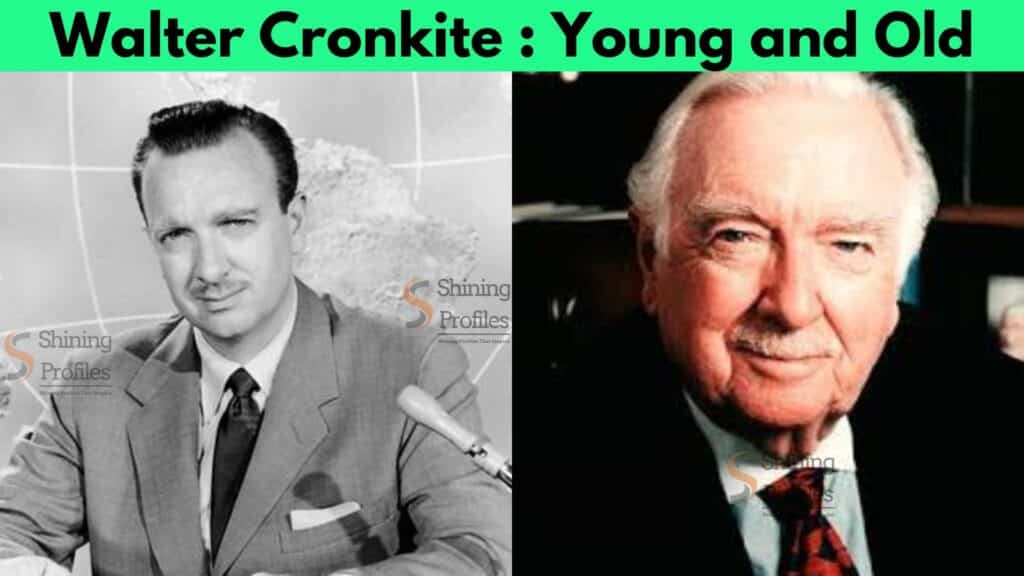Walter Cronkite stands as one of America’s most trusted voices in journalism.
With his steady, reassuring tone, he guided the nation through pivotal moments: the moon landing, the Vietnam War, and the assassination of President Kennedy.
Known as “the most trusted man in America,” Cronkite’s dedication to factual reporting earned him deep respect and an unparalleled legacy in broadcast news.
From the anchor desk at CBS, Cronkite delivered history in real-time. His commitment to honesty and clarity shaped how Americans viewed the world and defined the role of a journalist.
For millions, he was more than an anchor; he was the voice of truth and stability in uncertain times.
Even after retirement, Cronkite’s influence endured, and his timeless words still resonate with journalists and audiences alike.
His story is more than just a career in news—it’s a testament to the enduring power of integrity in journalism.
Walter Cronkite Net Worth

As of 2009, when Cronkite passed away, his estimated net worth stood around $20 million.
Though this might seem modest compared to today’s media moguls, it reflects his era in journalism, where anchoring news did not command celebrity-like salaries.
His wealth came primarily from his long career with CBS, spanning over three decades, along with other ventures post-retirement, including speaking engagements and documentary work.
Cronkite’s success was not only measured in financial terms but in the profound trust he garnered from viewers, which eventually solidified his influence on American media culture.
Key facts and figures about Walter Cronkite
| Aspect | Details |
| Full Name | Walter Leland Cronkite Jr. |
| Birth Date | November 4, 1916 |
| Birth Place | St. Joseph, Missouri, USA |
| Death Date | July 17, 2009 |
| Death Place | New York City, New York, USA |
| Education | Attended the University of Texas at Austin (did not complete degree) |
| Career Span | 1935 – 1981 (46 years in journalism) |
| CBS Evening News Anchor | 1962 – 1981 |
| Nickname | “The Most Trusted Man in America” |
| Famous Catchphrase | “And that’s the way it is…” |
| Key Historical Coverage | World War II, the Vietnam War, the Apollo 11 moon landing, President John F. Kennedy’s assassination, the Watergate scandal |
| Notable Awards | Peabody Awards: 2 (1961, 1970) Presidential Medal of Freedom: 1981 NASA Distinguished Public Service Medal: 1994 Emmy Awards: 6 total |
| Net Worth at Death | Estimated at $20 million |
| Wife | Mary Elizabeth “Betsy” Maxwell Cronkite (1940 – 2005) |
| Children | 3 (Nancy, Kathy, Walter III) |
| Post-CBS Work | Hosted various documentary series and specials; remained an advocate for journalistic ethics and standards |
| Boating Enthusiast | Owned a yacht named Wyntje and was a passionate sailor |
| Famous Quotes | “In seeking truth you have to get both sides of a story.” “Objective journalism and an opinion column are about as similar as the Bible and Playboy magazine.” |
You might like this: Dan Rather Net Worth, Salary Career & All About His Life
Early Life Background
Walter Cronkite was born on November 4, 1916, in Saint Joseph, Missouri. Shortly after, his family moved to Houston, Texas, where he grew up with a passion for news and storytelling.
He attended San Jacinto High School and later the University of Texas at Austin.
His time there allowed him to hone his journalism skills, though he left college early to pursue a career in radio.
He worked with United Press during World War II, delivering news stories that would lay the groundwork for his reputation as a reliable news source.
This experience shaped his approach to journalism and prepared him for a future that would see him cover the most significant events of the 20th century.
Family and Personal Life

Cronkite married Betsy Maxwell in 1940, and their relationship remained solid for more than 60 years until her death in 2005.
Together, they had three children: Nancy, Kathy, and Walter Leland Jr. His family life remained stable and largely private, contrasting with his public persona.
Betsy was not only his wife but a key source of support throughout his demanding career. His family cherished him as a father and husband, while the world saw him as a steadfast voice in journalism.
Wife of Walter Cronkite
Betsy Maxwell, a talented journalist herself, complemented Cronkite’s life by understanding the demands of his career.
Her passing in 2005 deeply affected him, as she had been both a personal and professional anchor in his life.
Their bond was strong, and she supported his career through its various stages, from his early radio days to his status as a national icon.
Qualification and Degrees
Although Cronkite didn’t complete his college degree, his early work experience compensated for it.
The University of Texas, however, honored his contributions by granting him honorary degrees later in life.
His career is a testament to the idea that practical experience, particularly his hands-on approach in war journalism, is invaluable in the news field.
Covering critical events like the Nuremberg Trials gave him unique insight into major global issues, something formal education couldn’t have offered at that time.
Walter Cronkite: Career

Walter Cronkite’s career trajectory was remarkable. Starting as a radio announcer, he made his name in print and radio journalism during WWII.
His reporting on the bombings in London and Nuremberg Trials established him as a credible voice.
When he joined CBS News in the 1950s, television was still a young medium, yet he adapted swiftly, bringing clarity to complex global stories.
His reporting style helped him become a trusted news figure, and he eventually became known for his emotional yet composed reporting style.
Career at CBS News
Cronkite joined CBS in 1950, and by 1962, he was anchoring the CBS Evening News.
His calm and neutral delivery style won public trust, and he became the primary face behind significant national events.
He covered some of the 20th century’s most monumental moments, including the assassination of President John F. Kennedy, the Civil Rights Movement, and the moon landing.
His phrase “And that’s the way it is,” which he used to close broadcasts, became iconic and reflected his reputation as a man committed to factual reporting without embellishments.
Historical Moments:
- First Trans-Atlantic Satellite Broadcast (1962): Cronkite participated in the first live trans-Atlantic broadcast via Telstar satellite, marking a milestone in global news coverage.
- Assassination of John F. Kennedy (1963): Cronkite broke the news of President John F. Kennedy’s assassination live on air on November 22, 1963, as the first reporter to inform the public.
- D-Day +20 Interview (1964): Interviewed General Dwight D. Eisenhower in a commemorative broadcast 20 years after D-Day.
- Vietnam War Coverage ( 1968): Cronkite visited Vietnam in February 1968 after the Tet Offensive to provide an on-the-ground report.
- Apollo 11 Moon Landing (1969): Celebrated the moon landing, famously saying, “Whew…boy” as Neil Armstrong stepped onto the lunar surface.
- Nixon’s Visit to China (1972): Covered Nixon’s historic visit to China, navigating personal challenges, such as his colorblindness.
- Watergate Scandal (1974): Cronkite’s coverage of Watergate helped solidify public awareness of the scandal, culminating in President Nixon’s resignation.
You might like this: Brian Williams Net Worth, Salary, Career & All About his Life
Post-CBS Career

Cronkite’s retirement in 1981 did not end his involvement in journalism.
He continued to make occasional television appearances, produced documentaries, and contributed to various media outlets.
His fascination with space led him to narrate several programs about NASA and the Apollo missions, reflecting his ongoing curiosity and passion for storytelling.
His continued work post-retirement demonstrated his dedication to journalism and education.
Retirement
Though Cronkite retired from CBS in 1981, he remained active, offering commentary and hosting various specials.
He occasionally provided his perspective on contemporary issues, lending his credibility to various causes.
His influence on journalism extended well into his retirement, and he was often consulted by newscasters and news outlets for his insights on media integrity and accuracy.
Awards and Honors
Walter Cronkite’s contributions to journalism were recognized by many prestigious awards.
He won several Emmy Awards, including one for his coverage of the Apollo 11 moon landing.
His Emmy awards underscored his impact, as did the Peabody Award and the Presidential Medal of Freedom.
Cronkite’s commitment to ethical journalism and his knack for making news accessible to the public set him apart from his peers and led to lasting recognition across multiple fields.
Did Walter Cronkite Own a Boat?

Yes, Cronkite was an enthusiastic sailor and owned a boat, which he frequently used for leisure and exploration.
Sailing was a hobby that provided him a sense of peace and freedom away from the pressures of television journalism.
He enjoyed traveling along the East Coast, and his boat was a central part of his life during retirement.
Death of a Legend
Walter Cronkite passed away on July 17, 2009, at the age of 92 due to cerebrovascular disease.
His death marked the end of an era in broadcast journalism, with numerous tributes pouring in from journalists, political figures, and fans alike.
People remembered him not just as a newscaster, but as a man who reported with unwavering honesty and authenticity.
His passing symbolized the close of a chapter in journalism that held reporters accountable to the highest standards. If you can find more details about Walter Cronkite on Wikipedia.
Walter Cronkite Quotes
Here are some most memorable Quotes by Walter Cronkite:
- “Freedom of the press is not just important to democracy, it is democracy.”
- “Our job is only to hold up the mirror—to tell and show the public what has happened.”
- “In seeking truth you have to get both sides of a story.”
- “And that’s the way it is.”
- “I am not a liberal. I’m not a conservative. I’m a journalist. I’m a reporter.”
- “When in doubt, tell the truth.”
- “Journalism is what we need to make democracy work.”
- “I think that the public always deserves the truth, and I think that a journalist who can’t tell the truth is in trouble.”
You might like this: Peter Jennings: All About His Life (1938-2005)
Conclusion
Walter Cronkite remains an icon of journalism, a figure of integrity, and a trusted source during America’s most pivotal moments.
His unique ability to convey truth and calm in times of turmoil helped shape public opinion and set high standards for future journalists.
Through his career at CBS and his dedication to factual reporting, Cronkite redefined what it meant to be a news anchor.
Even years after his passing, Cronkite’s legacy endures, reminding us of the powerful role of responsible journalism.
In his own words, “And that’s the way it is” – a tribute to a man who dedicated his life to the truth.
FAQs About Walter Cronkite
Did Walter Cronkite own a boat?
Yes, Walter Cronkite owned a yacht called Tide. He enjoyed sailing during his leisure time, especially in his retirement years. It was one of his hobbies that provided him a peaceful escape after his long career as a news anchor.
Was Walter Cronkite an alcoholic?
No, Walter Cronkite was not an alcoholic. Throughout his career, he was known for his professionalism, discipline, and balanced lifestyle. There is no evidence to suggest he struggled with alcohol or substance abuse.
What was Walter Cronkite’s net worth?
At the time of his death in 2009, Walter Cronkite’s net worth was estimated to be around $20 million. His wealth came from his long career as a journalist, along with various investments and his post-retirement work.
What were Walter Cronkite’s most famous quotes?
Walter Cronkite is best known for his catchphrase, “And that’s the way it is,” which he used at the end of his broadcasts. He also famously commented, “That’s one small step for [a] man, one giant leap for mankind” during the Apollo 11 moon landing coverage.
What did Walter Cronkite do after retirement?
After retiring from CBS News in 1981, Cronkite became involved in various activities, including hosting documentaries, writing books, and speaking at events. He also spent much of his time sailing, a passion he had enjoyed throughout his life.
When did Walter Cronkite die?
Walter Cronkite passed away on July 17, 2009, at the age of 92, due to complications from cerebrovascular disease at NewYork-Presbyterian Hospital in New York City.
What was Walter Cronkite’s role in the Apollo 11 moon landing?
Walter Cronkite was the anchor for CBS News during the Apollo 11 moon landing. His emotional and excited commentary, especially during Neil Armstrong’s first steps on the moon, became one of the most memorable moments in broadcast journalism.
What was Walter Cronkite’s most notable contribution to journalism?
Walter Cronkite is known for making broadcast journalism a trusted, credible source of news. He provided authoritative coverage on major historical events such as the Kennedy assassination, the Vietnam War, and the moon landing, and he was widely regarded as the “most trusted man in America.”
Was Walter Cronkite involved in politics?
While Walter Cronkite was primarily a journalist, he did occasionally share his opinions on political matters. Notably, his 1968 report on the Vietnam War, where he described it as a “stalemate,” had a significant impact on public opinion and U.S. policy at the time.

